SNU BioTalk 2025: An International Conference on "Symphony of Cellular Signals in Metabolism and Immune Response"
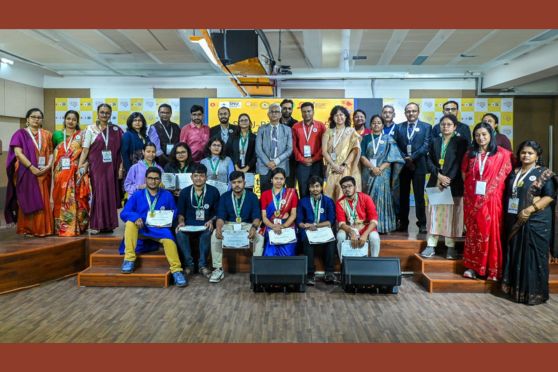

The SNU BioTalk 2025 an International Conference, themed "Symphony of Cellular Signals in Metabolism and Immune Response," was a landmark event organized under the visionary leadership of Prof. (Dr). Dhrubajyoti Chattopadhyay, the Hon’ble Vice Chancellor of Sister Nivedita University, Kolkata, India along with the esteemed conveners Dr. Sudipta Saha, Dr. Amit Sarkar, Dr. Anindita Banerjee from the Department of Microbiology and Biotechnology, and Dr. Moumita Das from the Department of Applied Nutrition and Dietetics, Sister Nivedita University, Kolkata.
This prestigious event brought together a diverse gathering of eminent scientists, accomplished researchers, esteemed faculty members, and enthusiastic students from across the country and around the globe. With more than 250 participants, the conference provided a vibrant platform for exchanging knowledge, fostering meaningful collaborations, and driving innovation across a broad spectrum of disciplines focused on cellular signalling, metabolism, and immune response.
This event celebrated the intricate world of cellular signalling, exploring its profound impact on metabolism, immune response, and disease management. It set the stage for meaningful dialogues and groundbreaking insights that promise to shape the future of biomedical research.
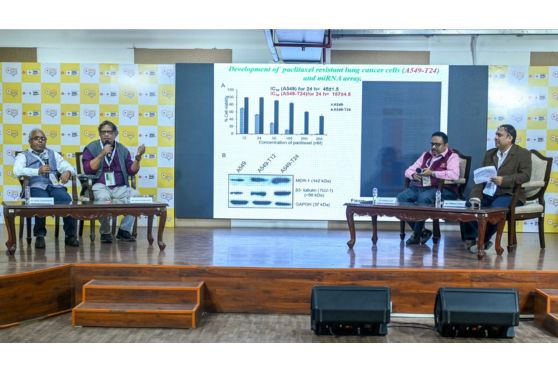
Keynote Sessions and Scientific Highlights
Following the inaugural ceremony, the spotlight swiftly turned to the much-anticipated keynote and plenary sessions, which set the scientific tone for SNU BioTalk 2025. This year, the conference had the honor of hosting eminent scientists Prof. (Dr). David Goltzman and Prof. (Dr). Andrew Karaplis from McGill University, Canada, Dr Venkatesh Balan from University of Houston, USA, Dr. Dipyaman Ganguly from Ashoka University, Sonipat, India and Dr. Soumen Basak from National Institute of Immunology, New Delhi, India whose groundbreaking contributions continue to shape the broader landscape of research and innovation. By sharing their pioneering insights, these speakers demonstrated the powerful impact that focused research, rigorous methodology, and collaborative efforts can have on propelling scientific progress.
Scientific Sessions
The conference featured three engaging scientific sessions that delved deeply into cellular signalling and its far-reaching implications:
1. Session I: Intracellular Signalling Processes of Cellular Metabolism This session explored the molecular intricacies of metabolic signalling, focusing on processes such as energy production, nutrient sensing, and homeostasis. It also highlighted how disruptions in these pathways contribute to metabolic disorders and chronic diseases, paving the way for novel therapeutic strategies.
2. Session II: Signalling Pathways in Physiological and Pathological Processes The second session focused on the dual roles of signalling pathways in maintaining physiological equilibrium and contributing to pathological conditions. From cancer to neurodegenerative diseases, the discussions emphasized advancements in targeting these pathways for innovative treatments.
3. Session III: Signalling in Innate and Adaptive Immunity This session illuminated the complex interplay between innate and adaptive immunity, showcasing how signalling networks regulate immune responses and maintain immune balance. The research presented provided a roadmap for advancements in immunotherapy, vaccine development, and immune-modulating treatments.
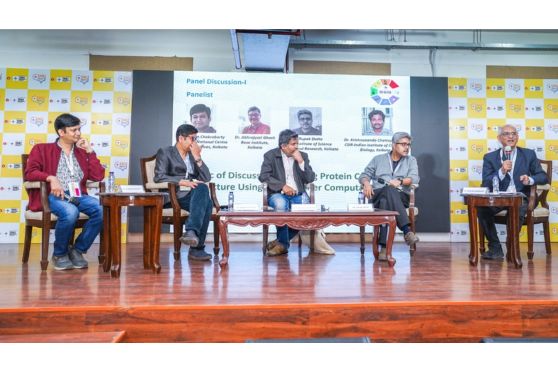
Chairs and Speakers of Scientific Excellence
Beyond the keynote sessions, the conference showcased an impressive roster of session chairs and invited speakers, each representing a pinnacle of scientific achievement in their respective domains. Topics ranged from neuroendocrinology and immunometabolism to systems biology and advanced imaging techniques. By gathering a diverse cohort of experts—whether they specialized in basic research, clinical applications, or translational initiatives—SNU BioTalK 2025 fostered a fertile environment for cross-pollination of ideas. In bringing together world-renowned speakers, SNU BioTalK 2025 successfully underscored its core objective: to encourage meaningful dialogue and catalyze novel collaborations in the field of cell signalling and metabolism.
Poster Presentations and Model Exhibitions
A key highlight of the conference was the enthusiastic participation in the poster presentations and scientific model exhibitions, which reflected the creativity and dedication of researchers and students alike:
• Poster Presentations: A total of 36 posters were presented, covering a wide range of innovative topics and emerging research. The session facilitated meaningful discussions and provided opportunities for constructive feedback and collaboration. From these, three outstanding posters were selected as winners for their exceptional quality, innovation, and scientific impact. Congratulations to the Best Poster Winners, whose work exemplified excellence in research.
• Model Exhibitions: The student-led scientific model exhibitions were another standout feature, with participants creatively showcasing complex biological concepts through engaging and interactive displays. These models bridged theoretical knowledge with practical understanding, sparking interest and appreciation among attendees. Winners from the Model Exhibition Categories were recognized for their innovation and creativity, and we extend our heartfelt congratulations to them.
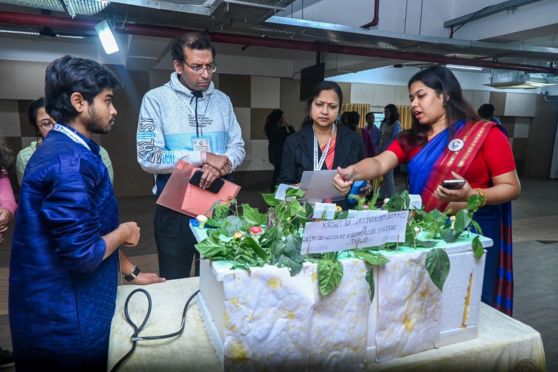
Panel Discussion
The panel discussion on "Cracking Protein Complex Structure Using AI and Other Computational Tools" and MicroRNA and its role in post-transcriptional gene regulation was a major highlight of the conference. This dynamic session convened leading experts in computational biology, molecular genetics, and bioinformatics to explore how emerging artificial intelligence (AI) technologies and advanced computational methods are propelling the life sciences into a new era of discovery. The discussion also underscored microRNAs as crucial regulators of gene expression, shedding light on how small, non-coding RNA molecules can exert profound influences on cellular processes and disease pathways.
Engaging Session by I-STEM, Government of India
An especially engaging and interactive session showcased the work of I-STEM, a pioneering initiative under the Government of India. I-STEM—short for the Indian Science, Technology and Engineering Facilities Map—is a dynamic national portal that seamlessly links researchers, resources, and R and D infrastructure across the country. A major takeaway from the session was the emphasis on collaboration and innovation. The COO and National Coordinator Dr Harilal Bhaskar, I-STEM demonstrated how the platform not only drives resource-sharing but also catalyses cross-disciplinary partnerships. By bringing together academia, industry, and government stakeholders, I-STEM effectively nurtures an ecosystem where scientific discovery, technological development, and economic growth go hand in hand.
Cultural Program
Adding to the vibrancy of the event was the cultural program, meticulously organized by the talented students of the Department of Microbiology and Biotechnology, Sister Nivedita University. This program blended traditional and contemporary art forms, providing a delightful interlude that balanced the academic rigor of the event. It was a testament to the holistic ethos of SNU, where intellectual pursuits and cultural expression go hand in hand.
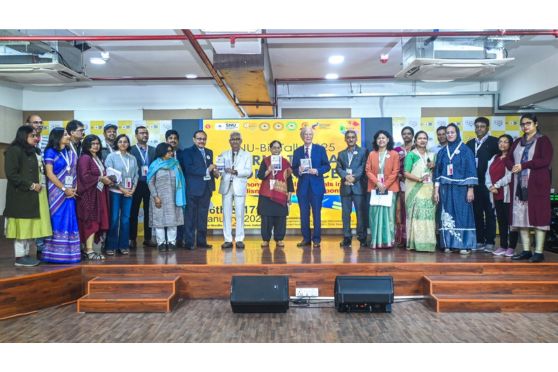
Exciting Reflections and Future Prospects
The conference also witnessed enthusiastic responses from the participants and the esteemed dignitaries. Dr. Sujoy Dasgupta, a distinguished delegate, expressed his excitement and delight at being part of SNU BioTalk 2025. He remarked, “It has been an inspiring and enriching experience. I eagerly await next year’s edition of SNU BioTalk 2026, which promises to build upon the momentum and achievements of this year’s conference.”
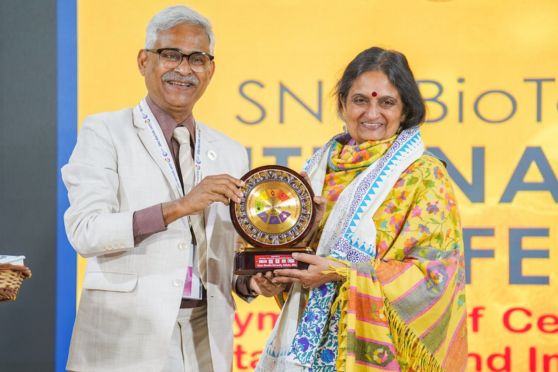
Concluding Remarks and Prospective Pathways
As SNU BioTalk 2025 draws to a close, it leaves an indelible legacy of knowledge, creativity, and collaboration. The thought-provoking discussions, novel insights, and shared aspirations that flourished during these sessions hold the potential to shape next-generation discoveries in cellular biology, metabolism, and immunology. Whether through groundbreaking research initiatives or visionary partnerships, the seeds sown at this conference are poised to grow into transformative projects that transcend traditional boundaries of the life sciences. From cutting edge presentations to lively debates and impromptu networking exchanges, every facet of the conference underscored the power of collective innovation in advancing scientific frontiers.
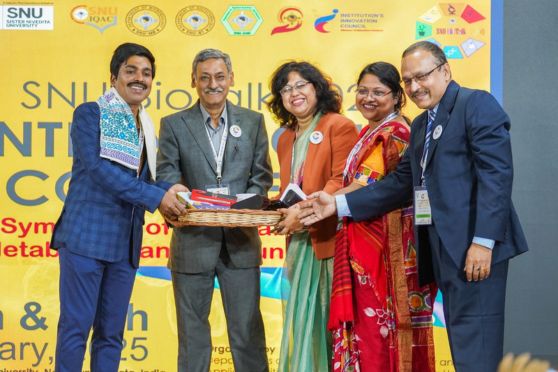
Looking ahead, attendees and the broader scientific community are invited to participate in the next edition of SNU BioTalk 2026, which promises to build on this year’s success. The conference remains committed to nurturing meaningful connections, fostering cross-disciplinary learning, and setting the stage for fresh breakthroughs poised to reshape the fundamental understanding of life.